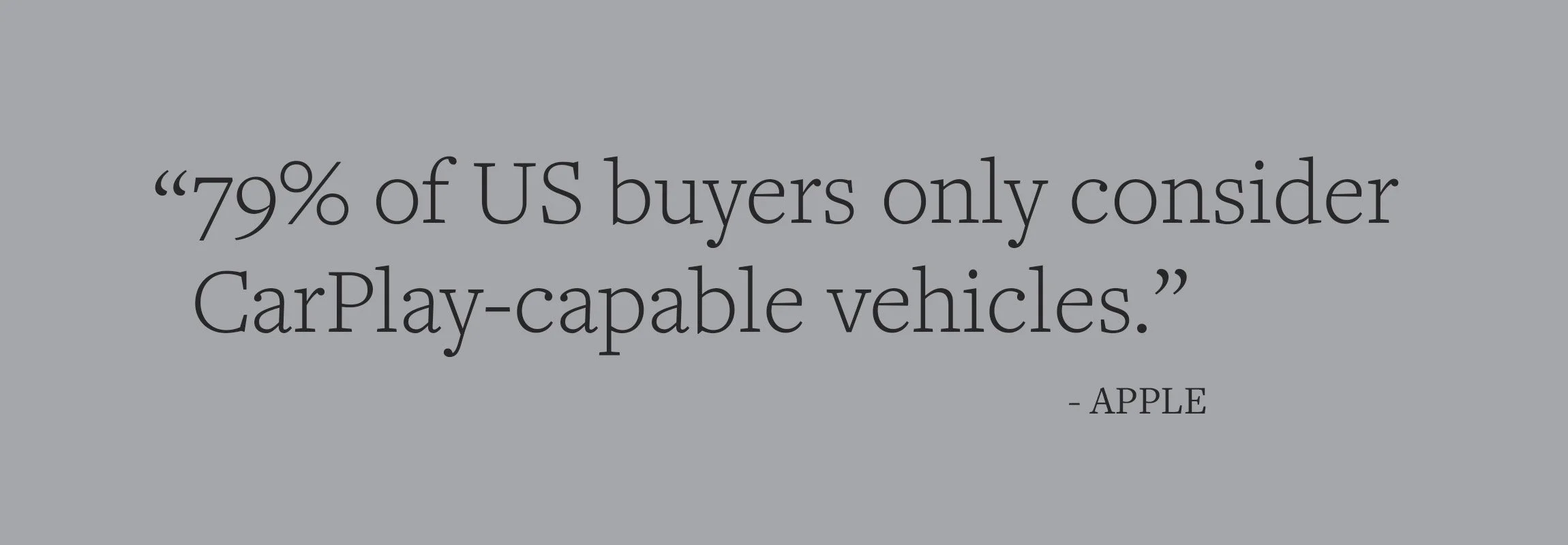INSIGHTSobering Up the Data (Part II)
Finding and correcting data biases is critical to realizing an anti-racist future.
Apple’s WWDC just gave us another fantastical looking glass picture of the future, this time about CarPlay. Sounds super cool, but who cares what I think about CarPlay. I want to exploit a single piece of data used in their exposition video. Here it is:
Apple has roughly 50% of the US smartphone market. Or thereabouts. So how on the good green and blue Earth is it possible that almost 80% of US car buyers will not consider a car that won’t make sweet digital love to their iPhones? Short answer: This statistic is perfectly polished, beautifully packaged, and assembled in California bullshit. Not to single Apple out for it. Nothing new here.
What Apple probably (definitely, knowingly) means is 79% of NEW car buyers in the US. And what Apple also knows is that iPhone users kinda skew toward the affluent.
Sober view: Americans buy a lot more used cars than new cars. In 2020, of the approximately 53.3 million cars sold in the US, over 70% of them once belonged to another owner. It’s pretty hard to get new technology into an old car.
Tech innovation is influenced, designed to fit, UX/UI’d, and built for too thin a demographic (re: white, wealthy). Yikes. Today, User Experience fits the mindsets, expectations, and needs of this narrow group, failing to recognize the sometimes very different and no less critical mindsets, expectations, needs, and requirements of other audiences—audiences who outnumber the first audience at least 2:1 in some significant cases. To market a status symbol as having widespread utility and appeal for 79% of US buyers isn’t just a convenient bending of light. It’s assuming that everyone wants what rich white people want, eventually.
….
Technology and its design are not inherently democratizing forces unless designed with inclusivity from day 1. In the example I began with here, I am suggesting that people who will buy Apple CarPlay-enabled used cars in a mere three years are ignored in design. There exists a plurality of Americans who will buy cars with systems and experiences that are intended, considered, ideated, designed, and manufactured for a demographic that is, at least somewhat, not them. That’s a lot of cars. That’s a lot of people.
When we fail to see inclusivity as a requirement, we are designing two worlds:
A world (+ eventual metaverse*?) where everything is connected, where the tangible and the ephemeral are united, governed by the tacit rules of systemic racism and classism: for the affluent, incumbent power holders, able to upgrade and maintain status in a world built to meet and shape their expectations.
A world for everyone else, disenfranchised downstream, misconnected, disconnected, despite being told they have equal economic import and sociocultural influence.
The onus is on the designers and makers to build anti-racist, inclusive models of success. Sniffing out self-congratulatory and convenient data is a place to start. We must take a longer view and invent processes that insist on considering the vast majority of all users—the now and the eventual, the rich and the less rich (but still buying loads of cars, for example).
We should work instead to think about how to re-approach design with true inclusivity in areas including health tech, education tech, payment processing, and digital banking. With inclusivity a design requirement and anti-racist models a tenant, we will start to do work that does more, and does better, for more people.
_______________
Matthew Thornton
17 June, 2022
* Admission: The idea of the metaverse nauseates me. I love the beach and the snowy mountains. Peoples’ actual faces are fascinating places. When I swipe my thumb upwards into thin air, I start to feel bad, as if Instagram has now invaded my muscle memory. I don’t have a TikTok account, and I’m convinced I’m not missing anything really. But I use my phone as much as you, dear reader, probably do. So… my data is biased. The first step on the road to digital recovery is acknowledging you have a problem.


